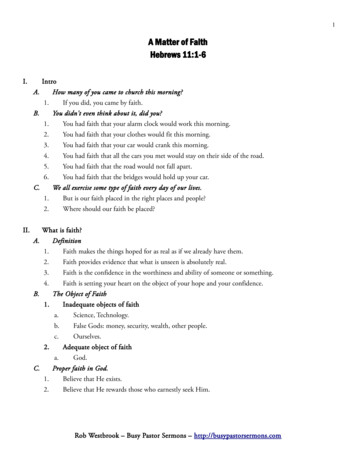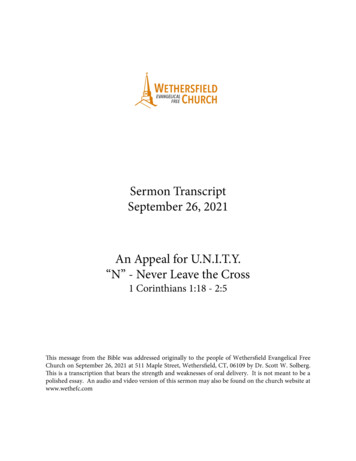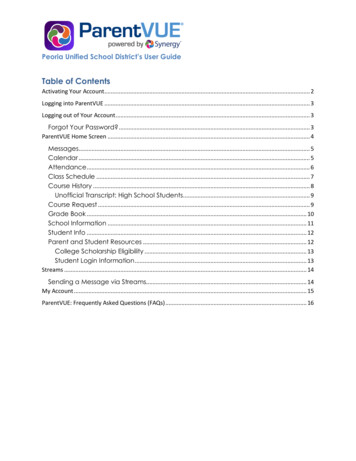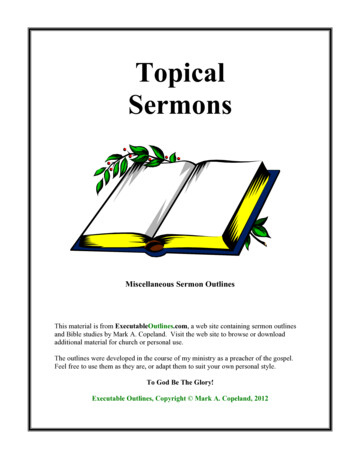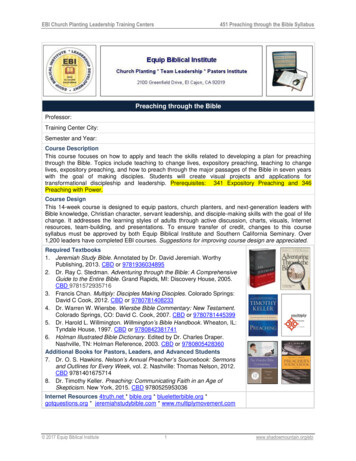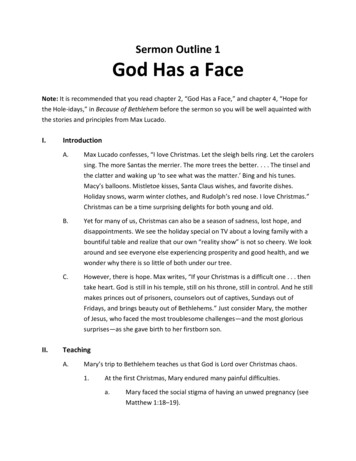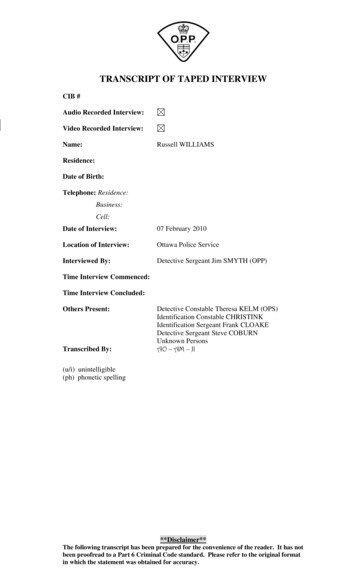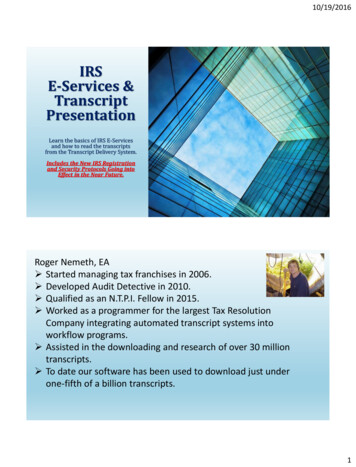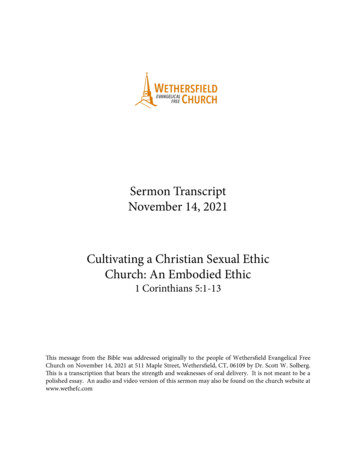
Transcription
Sermon TranscriptNovember 14, 2021Cultivating a Christian Sexual EthicChurch: An Embodied Ethic1 Corinthians 5:1-13This message from the Bible was addressed originally to the people of Wethersfield Evangelical FreeChurch on November 14, 2021 at 511 Maple Street, Wethersfield, CT, 06109 by Dr. Scott W. Solberg.This is a transcription that bears the strength and weaknesses of oral delivery. It is not meant to be apolished essay. An audio and video version of this sermon may also be found on the church website atwww.wethefc.com1
Sermon Text1 Corinthians 5:1-131 It is actually reported that there is sexual immorality among you, and of a kind that isnot tolerated even among pagans, for a man has his father's wife. 2 And you arearrogant! Ought you not rather to mourn? Let him who has done this be removed fromamong you.3 For though absent in body, I am present in spirit; and as if present, I have alreadypronounced judgment on the one who did such a thing. 4 When you are assembled inthe name of the Lord Jesus and my spirit is present, with the power of our LordJesus, 5 you are to deliver this man to Satan for the destruction of the flesh, so that hisspirit may be saved in the day of the Lord.6 Your boasting is not good. Do you not know that a little leaven leavens the wholelump? 7 Cleanse out the old leaven that you may be a new lump, as you really areunleavened. For Christ, our Passover lamb, has been sacrificed. 8 Let us thereforecelebrate the festival, not with the old leaven, the leaven of malice and evil, but with theunleavened bread of sincerity and truth.9 I wrote to you in my letter not to associate with sexually immoral people— 10 not atall meaning the sexually immoral of this world, or the greedy and swindlers, or idolaters,since then you would need to go out of the world. 11 But now I am writing to you not toassociate with anyone who bears the name of brother if he is guilty of sexual immoralityor greed, or is an idolater, reviler, drunkard, or swindler—not even to eat with such aone. 12 For what have I to do with judging outsiders? Is it not those inside the churchwhom you are to judge? 13 God judges those outside. Purge the evil person from amongyou.2
IntroductionHave you ever seen a movie where a scene from the movie is unfolding and you haveno idea how you got there? And then, at the height of your confusion, on the screenappears these words, “Four Months Earlier.” As the story of the previous four monthsunfolds, things start making sense. Or, perhaps you have seen a movie that begins withthe end and the rest of the movie is spent returning to where it began. The movieForrest Gump was like that. It began with Forrest sitting on a bench at a bus stop, andyou had no idea why he was sitting there. But then his story is told and near the end ofthe movie you are back where the movie began, Forrest Gump sitting at the bus stop.But now you know why he is sitting at the bus stop.That is how I feel when I step into 1 Corinthians 5. It is quite abrupt. It feels like itemerges out of nowhere. You are only two verses into this chapter and Paul is callingfor a certain man in the church to be removed from the congregation. In fact, in thesethirteen verses, four times Paul calls for this severe action to take place. In verse 5 hetells the church to deliver this man to Satan. In verse 7 he alludes to the Jewish practiceof Passover and he likens this man to old leaven that needs to removed from the house.And then the chapter ends with a final command from Paul, to suggest that he has notsoftened his stance in any way. “Purge the evil person from among you.”When I step into 1 Corinthians 5, I feel like asking for a “time-out!” “Wait a minute!”“What just happened here?” I feel like we have stepped into the end of something andI feel like we need the words “Four Months Earlier” to help us understand how we gothere. Unfortunately, we don’t have a lot of those details that would help fill in the storyfor us. What we do know is that there was a professing believer in Christ who was partof the church at Corinth and he was sleeping with his father’s wife. As grievous ofthing as that was, that is not what Paul is most worked up about in this passage. Themost pressing concern on Paul’s heart and mind in this passage is how the churchtolerated something that even the pagans of Corinth would consider to be highlyimmoral. Paul is drawing attention to the fact that the discipleship ministry of thechurch plays a vital role in “cultivating a Christian sexual ethic.” But in this specificcase, the church is not doing what it is called to do.Now having said that, we need to be very careful how we process through this passage.In his commentary on 1 Corinthians, after explaining what he thinks Paul is saying inthis passage, Gordon Fee asks a great question. “How, then, does all this function asGod’s Word for us?”1 In other words, what does WEFC need to hear from this3
passage? There are complexities to the text that need to be understood. What does itmean to “deliver this man to Satan”? And furthermore, a passage like this could bereadily abused. When it comes to sexual immorality among you, are we to functionmore like a courtroom or a hospital? If we are more focused on passing out judgmenton each other and less inclined to nurse those who are struggling with sexualtemptation, then Gordon Fee wonders out loud, “we would be in danger of starting aprocess of excommunication that finally eliminates us all.”2 Who here can cast thefirst stone? In fact, at the end of her book Love Thy Body, Nancy Pearcy issues thischarge to the church. “Christians must be prepared to minister to the wounded, therefugees of the secular moral revolution whose lives have been wrecked by its falsepromises of freedom and autonomy.”3 The sexually wounded are not just “out there”in the world . . . they are among us and we need to provide a strong and supportivecommunity for each other. And yet, I don’t think that is too different to what Paul issaying here, if you really understand the purpose of church discipline. It is not to bepunitive, like “cancel culture.” Church discipline done well is meant to be restorative.So what is the message of 1 Corinthians 5 to WEFC in 2021? I think it is this: thechurch is to embody what we teach. We need to embody purity before marriage andfidelity within marriage. It is not easy to believe and live out the Christian meaning ofsex. Dennis Hollinger says “Little around us upholds or reinforces Christian tenetsand ethics . . . Embodying the meaning of sex from a Christian worldview goes againstthe grain of almost everything in our society and culture.”4 So what do we need fromthe church? We need support. We need accountability in the context of grace andlove. Heath Lambert wrote a book for men who are struggling with pornography. Henotes that one of the key ingredients to helping men gain freedom from theiraddiction is accountability. One of his seven principles for accountability is that“effective accountability involves someone with authority.”5 So what we see in 1Corinthians 5 is the final step in a long process under spiritual authority thatencourages repentance and humility all along the way. It is the goal of Galatians 6:1,“Brothers, if anyone is caught in any transgression, you who are spiritual shouldrestore him in a spirit of gentleness.” The same “Paul” who wrote these words, wroteour passage this morning. We need the support of the church to help us cultivate aChristian sexual ethic as we embody what we believe.So as we step into this challenging passage, we want to consider what it looks like forus to embody a Christian sexual ethic. It is a struggle to embody a Christian sexualethic. It is messy. There is tension between truth and grace. But that tension is whereyou find love . . . which is at the core of what we are to embody.4
The RealityPaul begins this chapter by acknowledging reality. He received a report that there issexual immorality among you. In other words, he is saying to the church, “it is here.”“It is among you.” It is not just “out there” in the public arena. It is right here amongus. Pornography, it is here. Pre-marital sex, it is here. Adultery . . . here. Unbiblicaldivorce . . . Abortion . . . Giving into same-sex attraction . . . Sexual abuse . . . Present!Remember, the word translated sexual immorality is the word porneia which is a catchall word for any sexual activity outside of marriage between a man and a woman. This isreality in the church, broadly speaking. In various forms, it is present in any localchurch. In its many expressions, there is sexual immorality in the church. Does thatsurprise you? It shouldn’t surprise us, nor is this the “surprise” of this passage.When Paul identifies the specific sexual sin in this passage—a man has his father’swife—he says that this particular expression of sexual immorality is not even toleratedamong the pagans. It does beg the question, then, “What was the prevailing view of sexin Corinth at this time?” Well, it was quite promiscuous and it catered to the passions ofmen in power. The Roman culture would yawn at the outrage of the “Me Toomovement.” Sexuality in the Roman culture was not about identity (heterosexual,homosexual, bi-sexual), rather, it was more about power. If you were a male and aperson of power, you could exert your sexual prowess over those who were sociallydown the ladder from you and it was not considered immoral in the slightest. Sex wasseen as recreational and there was no problem with married men having sex with slaves(male or female), prostitutes, or other people of a lower class. Gordon Fee said that inthis culture you could matter-of-factly describe the sexual ethic for men of power thisway: “Mistresses we keep for the sake of pleasure, concubines for the daily care of thebody, but wives to bear us legitimate children.”6 But there was at least one sexual taboothat was categorized as “adultery.” It was wrong to sleep with another man’s wife. Ifthat is the case, how much more scandalous would it be to sleep with your father’s wife?That being said, this is the lifestyle people are coming out of when they converted toChrist. This is the lifestyle that stares them in the face day in and day out. It wasn’t aneasy transition to go from a pagan lifestyle of sex to the restrictions that come with theJudeo-Christian understanding of sex. Aside from dealing with the prevailing mood ofthe culture and the various things that would incite lust, they had to be discipled andtaught—their minds needed to be renewed so that they would not be conformed to thisworld, but transformed in their way of life. This was a major reality in Paul’s ministry.In 1 Thessalonians 4:3 Paul calls them to abstain from sexual immorality. In doing so he5
is keenly aware of the forces working against them. He tells them to control theirbodies, not in the passion of lust like the Gentiles who do not know God. Paul is awareof the constant tug of the culture on the church when it comes to the issue of sex. It doesnot surprise Paul to receive this report that there is sexual immorality among you.The surprise here is not that there are people in the church who struggle withmaintaining a Christian sexual ethic. That is reality. In fact, my biggest fear of walkingthrough 1 Corinthians 5 is that you will hear the wrong message. My fear is that you willthink that 1 Corinthians 5 is saying that if you are struggling with sexual immorality ofany kind, then you are on a fast track to being shown the door. That has happened.Preston Sprinkle tells the story of a woman who came to her pastor to tell him about herstruggle with gender identity and he got up from his seat and escorted her out the doorand told her never to come back again.7 That is not the message of 1 Corinthians 5. Thisis not a warning to members of a church to keep their sexual struggle under wraps,hidden from the light, because it is not safe. Dennis Hollinger opens up his book on TheMeaning of Sex by observing that “We live in a sex-crazed world . . . Surely a visitorfrom another planet would say of this age, ‘Sex is everywhere and always on theirminds.’”8 So to find this struggle among us is no surprise. It is anticipated, expected.The surprise of the passage is how the church is tolerating it. Paul said that the leadersof the church were arrogant. How so? Most likely they were giving theological cover forthis illicit activity—exerting their own authority over that of Christ and the apostles.Instead of calling this man to repent, they were putting his conscience at ease andallowing him to live contrary to the purposes of God. Look, I get it. I feel it deeplywhenever I do a sermon series like this. Traditional Christian sexual morality is amarginalized view of sex and we can feel like we are on an island unto ourselves to evensuggest that sex is to be fenced in by marriage between a man and a woman. This is therealm in our culture where our faith will cost us. So it should not surprise us that thestruggle to live it out is among us. In fact, we want to live that struggle openly with eachother. What should surprise us is if we fail to call God’s people to a holy sexuality thatsubmits to the Lordship of Christ. That was the reality of what was happening in thechurch at Corinth. That cannot be our reality. We can’t embody what we don’t teach.The ResponseHaving considered the reality of sexual immorality among you the response is still,nonetheless, challenging to our modern ears. What are we to hear when Paul calls onthe church to remove this person from their fellowship, to deliver him over to Satan, to6
cleanse themselves of this person’s presence, to not associate with this person or eatwith this person, to purge this person from among them. That is a lot to take in and Iam sure you have some of the same questions I have had all week.For example, “What in Paul’s instructions were unique to this specific situation andwhat becomes a universal principle in applying this passage? It seems like this man’ssin was having an adverse affect on the life and witness of the church so perhaps that isa principle that applies universally. “What are we to make of the instruction to “deliverthis man to Satan for the destruction of his flesh?” Hebrews 13:17 tells us to submit toour spiritual leaders because they are keeping watch over your souls. To removesomeone from this cover puts them back out under the realm of Satan, the world. Theprayer is that this kind of severe action would lead to the destruction of his flesh. Pauloften uses flesh to refer to the sinful nature we are called to crucify. And so the intent isthat this kind of response will lead to spiritual good. “What about the instruction tonot associate with this person or eat with this person?” At the very least, the personunder this kind of discipline is removed from the community of the church and cannotparticipate in the observance of Communion and the meal that went along with it.They are out of fellowship with the church. I don’t think it means that this person is beshunned in all social settings. Paul says in 2 Thessalonians 3:15 that the one underdiscipline is not to be seen as an enemy but as a brother. As you can imagine, thesequick responses take up pages of debate in the commentaries and my responses happento be where I have landed at this point.But as we sift through the fog of the complexities of this passage and the questions thatemerge, what is the point we need to see in Paul’s response to this man’s persistent andwillful sin? The title to this sermon series is Cultivating a Christian Sexual Ethic. Lastweek, we saw that we cultivate this ethic with biblical thinking about sex . . . It isforming a Christian worldview of sex that is anchored in the gospel. This morning wediscover that God has also given us the church to help us cultivate a Christian sexualethic. When we become followers of Christ, we are submitting ourselves to theLordship of Christ. Discipleship is a call to obedience. I have encountered severalstories recently of people who are attracted to the same sex and have come to faith inChrist out of the LGBTQ community. And while still confessing that they areattracted to the same sex, their understanding of Scripture has led them to theconviction that this lifestyle is not sanctioned by God. Their primary identity is Christand so they submit themselves to the Lordship of Christ. We are called to obedience.That obedience is lived out under the authority of the church. Everyone of us has “next7
steps of obedience” to take. None of us have fully arrived. In accountability to eachother, we confess our sins to one another. We support and encourage one another. Sothis is not about being perfect. If this man in our passage would have repented of his sinand began to walk in obedience, his sin would have never been reported to Paul. In fact,Jesus has established a pattern of helping people walk in obedience. First they areconfronted by an individual, then by several Christians together, and then by the entirechurch. This happens over a period of time (Four Months Earlier) and at each step thereis opportunity to repent.Heath Lambert observed in his book on pornography that there is something powerfulabout being accountable to those in authority over you. He said, “It’s more sobering tobe called to repentance by a pastor or the elders than by a person in your communitygroup.”9 It is not because these leaders are “better than anyone else.” It is their role ofauthority that brings more accountability. When that confession is made, Paul tells theleaders in Galatians 6 to restore this person with gentleness and to bear this person’sburden. It doesn’t mean you won’t fall again. It doesn’t mean that there are quick andeasy fixes to your issues. But you have a church body walking with you and encouragingyou to take a next step of obedience . . . helping each other to embody what we teach.The ReasonWhat is the reason why Paul responds the way he does to the reality taking place in thechurch at Corinth? He gives the reason for his response in verses 6-8. He looks back tothe Jewish celebration of Passover and reminds them of two events that take place in thisannual Jewish celebration. First, they cleanse the house of any leaven because when theyleft Egypt they had to leave so fast that there was no time for the bread to rise. So the oldleaven represents their old life in bondage. Secondly, he refers to the Passover Lamb thatwas sacrificed. This looks back to the blood of the lamb that was applied to thedoorposts, saving them from the angel of death. So what is his point?First of all, we are inclined to read passages like this from a personal perspective. Wetend to limit our thinking to our own struggle with sexual immorality. But Paul’sinstruction here is not focused on the individual. It is focused on the community, thechurch. Do you remember back in chapter 3, Paul said that the church is God’s Temple.In fact, he got real direct with them in 1 Corinthians 3:17 and said, “For God’s temple isholy, and you are that temple.” The church is the presence of God in that city. In a cityfilled with pagan temples and pagan practices, they need to be reminded that they arethe temple where the true and living God resides. This man’s unrepentant sin has8
infected the entire church. His persistence in living in willful and blatant sin isimpacting their ability to be God’s presence in a city that needs to see an embodiment ofwhat it means to follow Jesus. How often have we seen the reputation of the church takea hit because of some new headline of sexual immorality within the church? Byremoving this man through discipline, they are getting rid of the “old leaven” so thatthey may become “a new lump” . . . a new batch of dough. And this is interesting. Pauladds in the middle of verse 7 the phrase, “as you really are unleavened.” In other words,because of the sacrifice of our Passover Lamb, Jesus, we already are made new by thegrace of Christ. So basically he is calling us to live in the reality of what we already are asthose who have been washed, sanctified and justified in the Lord Jesus Christ.I like the way Richard Hayes puts it. He says, “The Corinthians are to stop seeingthemselves as participants in the normal social and economic structures of their city andto imagine themselves instead as members of the people of God, acting in a way thatproclaims the kingdom of God . . . a new community.”10 We are called to be a newcommunity, an alternative city that embodies a Christian sexual ethic and thereforebecomes a place of healing for a sexually confused and wounded culture.Which brings me to one final observation. Please notice that when Paul says in verse 9not to associate with sexually immoral people he quickly clarifies what he means. Hisclarification tends to be the opposite of how we respond to sexual immorality. He says,“I am not talking about staying away from those outside of the church.” His commenthas to do with the persistent sin inside of the church. Gordon Fee put it this way, “Freeassociation outside the church . . . strict discipline within the church . . . so that we don’ttake on the character of the world in which we freely live.”11 We tend to be quick tojudge the world and slow to disciple our own. But let us disciple our own so that we canreach the world.ConclusionSo . . . what does WEFC need to hear from this challenging passage? I will tell you whatI heard. The struggle with sexual immorality is a reality within the church. I am notsurprised by that and I would assume neither are you. But that is why God has given usthe church. We are here to support each other, bear each other’s burdens, confess toeach other as we submit our lives to the Lordship of Jesus the authority of the church. Itis all because of what we already are in Christ. We are a new community, a city on a hill,a place that welcomes the wounded and the broken as we point people to Jesus. ByGod’s grace, we seek to embody what we teach, bringing healing, hope and salvation.9
Gordon Fee The First Epistle to the Corinthians revised edition (Grand Rapids: Eerdmans, 2014)2342Ibid., 2343Nancy Pearcy Love Thy Body (Grand Rapids: Baker Publishing, 2018) 2644Dennis Hollinger The Meaning of Sex (Grand Rapids: Baker Books, 2009) 2235Heath Lambert Finally Free (Grand Rapids: Zondervan, 2013) 506Fee, 2157Preston Sprinkle Embodied: Transgender Identities, The Church and What the Bible Has to Say(Colorado Springs: David C Cook, 2021) 178Hollinger, 119Lambert, 5110Richard B. Hayes First Corinthians, Interpretation: A Bible Commentary for Preaching andTeaching (Louisville: Westminster, John Knox Press, 1997) 9811Fee, 249110
by Dr. Scott Solberg - All rights reserved11
Sermon Title: Church: An Embodied EthicSermon Text: 1 Corinthians 5:1-13Sermon Date: November 14, 2021Getting To Know Me Questions1. How did you see God at work in your life this week?2. When it comes to cultivating a Christian sexual ethic, what tensions do you feelaround this issue?Diving Into The Word3. Read Hebrews 3:12-14. What is the function of other brothers and sisters in yourwalk with Christ? What makes it hard for us to get to the place where we willinglyreceive “exhorting” from other believers?4. Read Matthew 1815-17. What is the process for reconciling with others? Why doeswhat seems so simple often seem so hard to do?5. Read 1 Corinthians 5:1-8. What are you initial reactions to this passage? Why is itimportant to the health of the church to not affirm someone in open andunrepentant sin?6. Read 1 Corinthians 5:9-13. How do Paul’s words here help us understand howChristians are to interact with non-Christians in our community?Taking It Home7. What are your big takeaways from this chapter and your discussion?8. What prayer requests emerge from your study and discussion?12
Nov 14, 2021 · An audio and video version of this sermon may also be found on the church website at www.wethefc.com . 2 . What we do know is that there was a professing believer in Christ who was part . case

